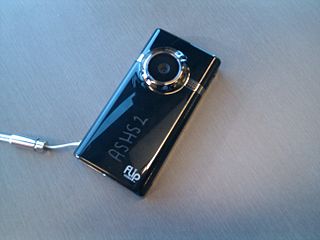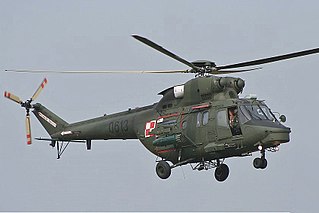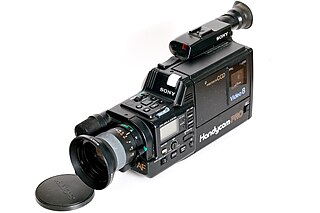
A digital camera, also called a digicam, is a camera that captures photographs in digital memory. Most cameras produced today are digital, largely replacing those that capture images on photographic film or film stock. Digital cameras are now widely incorporated into mobile devices like smartphones with the same or more capabilities and features of dedicated cameras. High-end, high-definition dedicated cameras are still commonly used by professionals and those who desire to take higher-quality photographs.

A webcam is a video camera which is designed to record or stream to a computer or computer network. They are primarily used in video telephony, live streaming and social media, and security. Webcams can be built-in computer hardware or peripheral devices, and are commonly connected to a device using USB or wireless protocols.

A camcorder is a self-contained portable electronic device with video and recording as its primary function. It is typically equipped with an articulating screen mounted on the left side, a belt to facilitate holding on the right side, hot-swappable battery facing towards the user, hot-swappable recording media, and an internally contained quiet optical zoom lens.

A professional video camera is a high-end device for creating electronic moving images. Originally developed for use in television studios or with outside broadcast trucks, they are now also used for music videos, direct-to-video movies, corporate and educational videos, wedding videos, among other uses. Since the 2000s, most professional video cameras are digital.

A video camera is an optical instrument that captures videos, as opposed to a movie camera, which records images on film. Video cameras were initially developed for the television industry but have since become widely used for a variety of other purposes.

The PZL W-3 Sokół is a medium-size, twin-engine, multipurpose helicopter developed and manufactured by Polish helicopter company PZL-Świdnik, now owned by Leonardo. It was the first helicopter entirely designed and produced in Poland.
The Denel Dynamics Seeker is an unmanned aerial vehicle (UAV) manufactured in South Africa by Denel Dynamics. The system is designed to perform tactical reconnaissance in real time and can conduct day and night surveillance in all threat environments.
The following are common definitions related to the machine vision field.

Sony Corporation produces professional, consumer, and prosumer camcorders such as studio and broadcast, digital cinema cameras, camcorders, pan-tilt-zoom and remote cameras.

Mesa Associates' Tactical Integrated Light-Force Deployment Assembly (MATILDA) is a remote controlled surveillance and reconnaissance robot, created and designed by the 'Mesa Robotics Corporation'. It is available in many different models such as the Urban Warrior, Block II, and Scout, which feature different combinations of components for increased utility. These options include a sensor mount, manipulator arm, weapon mount, fiber optic reel, remote trailer release, and disrupter mount. When purchased the basic system includes the platform, the control unit, and battery charger.

The Cromemco Dazzler was a graphics card for S-100 bus computers introduced in a Popular Electronics cover story in 1976. It was the first color graphics card available for microcomputers. The Dazzler was the first of a succession of increasingly capable graphics products from Cromemco which, by 1984, were in use at 80% of all television stations in the U.S. for the display of weather, news, and sports graphics.

The Martin/General Dynamics RB-57F Canberra is a specialized strategic reconnaissance aircraft developed in the 1960s for the United States Air Force by General Dynamics from the Martin B-57 Canberra tactical bomber, which itself was a license-built version of the English Electric Canberra. It was operationally assigned to the Air Weather Service for weather reconnaissance involving high-altitude atmospheric sampling and radiation detection in support of nuclear test monitoring, but four of the 21 modified aircraft performed solely as strategic reconnaissance platforms in Japan and Germany.
PRISMA is an Italian Space Agency pre-operational and technology demonstrator mission focused on the development and delivery of hyperspectral products and the qualification of the hyperspectral payload in space.

The Samsung Galaxy S4 Zoom is a phone with camera hybrid with a 10x optical zoom with f/3.1-6.3 lens with built-in optical image stabilizer and a standard xenon flash. It was introduced in July 2013.

Pixel Camera is a camera phone application developed by Google for the Android operating system on Google Pixel devices. Development with zoom lenses for the application began in 2011 at the Google X research incubator led by Marc Levoy, which was developing image fusion technology for Google Glass. It was publicly released for Android 4.4+ on the Google Play on April 16, 2014. The app was initially released as Google Camera and supported on all devices running Android 4.4 KitKat and higher. However, in October 2023, coinciding with the release of the Pixel 8 series, it was renamed to Pixel Camera and became officially supported only on Google Pixel devices.

WB Electronics Warmate is a class of loitering munition UAVs developed by the Polish defence contractor WB Group. It can be equipped with several different payloads, including fragmentation, HEAT and thermobaric warheads and has a swarming capability.

The Samsung Galaxy S20 is a series of Android-based smartphones developed, manufactured, and marketed by Samsung Electronics as part of its Galaxy S series. They collectively serve as the successor to the Galaxy S10 series. The first three smartphones were unveiled at Samsung's Galaxy Unpacked event on 11 February 2020 while the Fan Edition model was unveiled at Samsung's Galaxy Unpacked event on 23 September 2020.

The ZSSW-30 is a Polish remotely controlled turret designed by Huta Stalowa Wola and WB Electronics as a replacement for the Hitfist-30P turret of the Rosomak APC. It will also be fitted on the Borsuk IFV.
TELDAT is a Polish company established in 1997, headquartered in Bydgoszcz. It operates in the arms industry with a focus on electronics, information technology, and telecommunications. The company is actively involved in research and development in the fields of information technology and electronics. TELDAT specializes in designing and manufacturing data communications systems, computers, software, and data transmission devices, particularly for military applications.

FlyEye – an unmanned aerial vehicle developed by the Polish company Flytronic, belonging to the WB Group, intended for close reconnaissance.
















